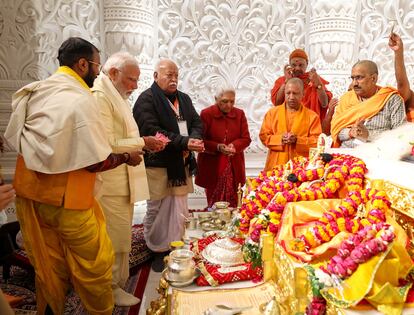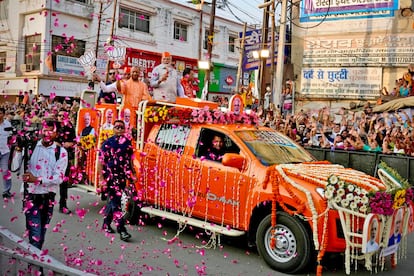Narendra Modi hopes to renew his mandate in India in the largest elections on the planet
Around 970 million voters will be called to the polls starting Friday while the opposition and international organizations criticize the Hindu nationalist government’s democratic backsliding


The great global election year continues. And this time it is up to the largest mass of voters on the planet to choose their political destiny. Next Friday elections start in India, the most populous country on the planet, and a rising economic and geopolitical power. Around 970 million people will head to the ballot boxes spread over more than one million polling stations in 543 constituencies, and more than 5.5 million electronic voting machines will swing into action. The process, which begins on April 19, run for 44 days until June 1 and will extend across the vast Asian subcontinent in seven phases with the results expected to be announced on June 4.
Behind the dizzying figures, however, lies a polarized climate. Polls and analysts are predicting a comfortable victory for the ruling Hindu nationalist Bharatiya Janata Party (BJP). This will renew the mandate of the current Prime Minister Narendra Modi, who has been in power for over a decade. Meanwhile, various international organizations have criticized the country’s democratic backsliding and the discrimination against minorities, especially Muslims. And the opposition has reported being the victim of political persecution by state institutions, and warns of the risk that constitutional secularism could be compromised in the name of Hinduism if the BJP wins again.
The 73-year-old Modi has set himself the threshold of reaching 370 seats out of the 543 at stake in the Lok Sabha, the lower house of the Indian parliament, which will be in charge of investing the new government. That would give him 67 more seats than he had in 2019. And the formation of the new government would make the BJP the senior coalition partner with the National Democratic Alliance. This would give the government an unassailable majority of more than 400 seats, which would give it room to undertake reforms with hardly any counterweights.
Opposing Modi there is a raft of opposition parties, the largest of which is the Congress Party, with Rahul Gandhi at its head. The 53-year-old is the latest Gandhi in a key dynasty in Indian politics. Rahul Gandhi is the son of the assassinated former prime minister Rajiv Gandhi and former prime minister Sonia Gandhi, grandson of the also assassinated former prime minister Indira Gandhi and great-grandson of Jawaharlal Nehru, first head of government after independence.
Voters returned only 50 members of the Congress Party in 2019, and Gandhi was expelled from Parliament in 2023, after being condemned for calling the prime minister a “thief.” The leader of a group that has played a key role in forging today’s India has tried to reverse the polls by cross-crossing the country on foot and by bus. Between 2022 and the beginning of this year he has marched and trekked about 7,145 miles to take the political pulse in all of India’s states and set out his vision. A recent India TV-CNX poll, however, gives Modi’s coalition 399 of the 543 MPs; The opposition alliance remained at 94, with the Congress Party at their lowest number: 38 seats, an even worse result than in 2014.
Modi has his fiefdoms in northern and western India. His success is among the middle and working classes. He has the sympathy of the lower castes, from which he claims — questionably — to have come himself. And he enjoys a special pull in the so-called cow belt, the rural strip where the Hindu religion carries considerable weight. Some see him as a deity.
“He is a person that people not only respect, but revere. And that veneration can be very useful for the ruling party to achieve a large number of votes,” says Harsh Vardhan Shringla, former Secretary of State for Foreign Affairs between 2020 and 2022, in a telephone conversation. Although he is not affiliated with the BJP, he is close to the party. He says that Modi’s success is due to numerous factors that begin with his leadership. He cites everything from infrastructure projects to the millions of people who have left poverty (almost 250 million in the last nine years, according to NITI Aayog, a public policy think tank). “There has been great development in all areas” and “many efforts to serve the most disadvantaged sectors,” he says. “In general, there is a feeling that the government has kept its promises.”

Shringla was the coordinator of the G20 summit held in India in 2023, an event that raised the country’s profile, says Shringla. In recent years, India has become a pivot, a kind of third way that is close to the West faced with the rise of China. “Our position on the international stage is not the same as it was ten years ago.” If a decade ago India was the tenth largest economy in the world; today is the fifth. Its growth rates are among the highest of large nations, and it has a legion of workers: around 65% of the Indian population is under 35 years of age. “One thing is certain,” the diplomat concludes, “today we are at the decision-making table.” And all that influences choosing a party.
But behind the Rock star image that has been conferred on Modi during his state visits, one can also sense a discourse that has divided Indian society. This is what university professor Apoorvanand Jha, a common voice among critics of the presidential Cabinet, criticizes on the phone. Modi, he explains, came to power in 2014 with language that was already destined to polarize. He talked about development and nationalism and, unlike other leaders, he was able to express his Hindu nationalist position “unapologetically.” He took over the Executive thanks to the “hopes and desires” of the citizens. “What has happened in the last ten years is the complete collapse of the Indian state as we knew it. Because democracy is not just about holding elections, but it is also about a fine balance in the institutional framework.”
Apoorvanand assures that the government is making it “almost impossible for the opposition to even participate in the elections,” and lists recent examples that the opposition also clings to in order to complain about the alleged harassment of institutions co-opted by the BJP. Since 2014, as many as 25 prominent opposition politicians facing corruption allegations have defected to the ruling BJP; in 23 of these cases, this change of allegiance resulted in a pardon, according to a recent investigation by The Indian Express.
Another example provided by critics is that in February, the Congress Party announced that its accounts had been frozen due to an alleged case of non-payment of taxes. “We cannot support our workers, and our candidates and leaders cannot travel by plane or train,” Gandhi complained in March, according to the AP. “This is a criminal action (…) done by the Prime Minister and the Home Minister.” In another example, the Chief Minister of Delhi, Arvind Kejriwal, who leads the second party in the opposition coalition, has been in prison since March, accused of corruption, which has prevented him from participating in the campaign.
“The crackdown peaceful dissent and opposition by the Indian government led by the BJP has reached a crisis point,” Amnesty International recently reported. Its own accounts in the country were also frozen and the organization was forced to close its offices in the India in 2020. In March this year, the United Nations High Commissioner for Human Rights Volker Türk expressed concern about “increasing restrictions on civic space — with human rights defenders, journalists, and perceived critics targeted — as well as by hate speech and discrimination against minorities, especially Muslims.” And according to Human Rights Watch: “The BJP government’s discriminatory and divisive policies have led to increased violence against minorities, creating a pervasive environment of fear and a chilling effect on government critics (…). Instead of holding those responsible for abuses to account, the authorities chose to punish the victims, and persecuted anyone who questioned these actions.”
One of the most recent episodes in this tension between Hindus, who make up 80% of the country, and Muslims, who account for 14.2% of India’s population, was Modi’s decision to inaugurate a Hindu temple on the disputed site of a centuries-old mosque. This was destroyed in an attack by a Hindu mob in the 1990s that caused thousands of deaths and set a precedent of impunity in cases of violence against Muslims in the country. The inauguration just before the elections was a calculated move, according to journalist Sandeep Dikshit, associate editor at The Tribune: “The prime minister wants to take credit for recovering a cultural symbol that he said had been taken by the Muslims 600 or 700 years ago.”
Pratishtha Singh, a member of Rahul Gandhi’s team, says on the phone that the last 10 years have been a necessary “wake-up call.” “Our democratic institutions, our judiciary, the media, the bureaucracy… have been diluted beyond recognition.” And she believes, like other analysts and institutions defending civil rights, that a good part of the responsibility lies with the acts of hatred against Muslims and lynchings that go unpunished or have the approval of BJP leaders. “If there is no punishment for these crimes, what kind of democracy and institutions do we have?”
With the accounts frozen, Gandhi’s party is operating through donations and contributions from its members, says Singh. But the opposition alliance has filled in the cracks that appeared and assures that things are looking good. In her words: “I don’t like to predict elections, but, in terms of the Congress Party gaining ground, our calculations point in that direction.”
Sign up for our weekly newsletter to get more English-language news coverage from EL PAÍS USA Edition
Tu suscripción se está usando en otro dispositivo
¿Quieres añadir otro usuario a tu suscripción?
Si continúas leyendo en este dispositivo, no se podrá leer en el otro.
FlechaTu suscripción se está usando en otro dispositivo y solo puedes acceder a EL PAÍS desde un dispositivo a la vez.
Si quieres compartir tu cuenta, cambia tu suscripción a la modalidad Premium, así podrás añadir otro usuario. Cada uno accederá con su propia cuenta de email, lo que os permitirá personalizar vuestra experiencia en EL PAÍS.
¿Tienes una suscripción de empresa? Accede aquí para contratar más cuentas.
En el caso de no saber quién está usando tu cuenta, te recomendamos cambiar tu contraseña aquí.
Si decides continuar compartiendo tu cuenta, este mensaje se mostrará en tu dispositivo y en el de la otra persona que está usando tu cuenta de forma indefinida, afectando a tu experiencia de lectura. Puedes consultar aquí los términos y condiciones de la suscripción digital.








































